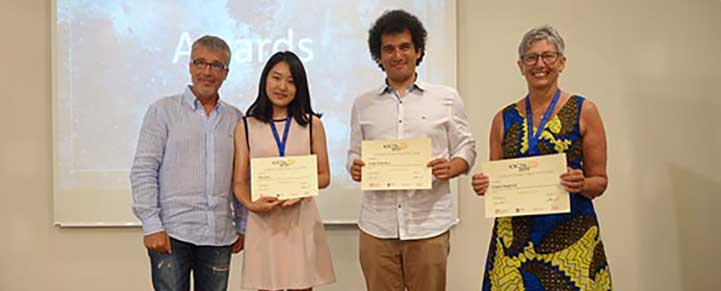

The ICICTE Graduate Student Paper Award, ICICTE 2019 is for research contribution by students submitting their papers to the conference. Up to five finalists will be invited to present their research at the Graduate Student Award Symposium of the conference. All final papers will be published in the conference proceedings.
Submission Procedures:
All student submissions that will indicate they are intended for the contest will be considered for entry in the the ICICTE Student Paper Award. Students must be the first author and be the on-site presenter of the paper.
Graduate Student Papers will be double-blind peer evaluated by members of the adjudicating committee.
Authors of accepted proposals will be required to submit the first draft of their paper along with a letter from their graduate advisor stating why they believe their student’s paper should be considered for the award (Deadline: March 22, 2019). Up to five students will be invited to present their research in the Graduate Student Award Symposium.
Only one student may be the first author, and the student's supervisor may appear on the paper as the second author. No cooperation research projects are eligible for the contest.
The student finalists papers will be published as submitted as completed manuscripts. Those papers submitted for the contest that will not be finalists and that are subsequently invited to participate in the conference plenary sessions, will receive comments by the referees in the same way as all other papers excluding finalist papers.
The winner of the Graduate Student Paper Award will receive an award and a certificate from the conference. All finalists who are present during the closing ceremonies will receive a citation. In addition, all papers will automatically be considered for the ICICTE 2019 selected papers issues of contributing journals.
These are the past winners of the Graduate Student Paper Award:
ICICTE 2017
A Design Methodology for Investigating Domain-Specific Aspects of Technological Pedagogical Content Knowledge through the Teaching of Music: The Importance of Affect
Elena Macrides Christofides (in photo above) and Charoula Angeli, University of Cyprus, Cyprus.
ICICTE 2016
Evaluating ICT initiative in Schools in Northern Kenya: Expected failures, unintended consequences
Yein Suh, Teachers College, Columbia University, United States of America.
ICICTE 2015
Emotional Experiences in Simulated Classroom Training Environments
Kalliopi Evangelia Stavroulia (Ph.D Candidate) and Evanthia Makri-Botsari and Sarantos Psycharis (ASPETE), and Gerassimos Kekkeris, Democritus University of Thrace, Greece.
ICICTE 2014
Ami & Ed: Moving Image Art vs Dead Modernist Artists
Mark Smith, Loughborough University, United Kingdom.
ICICTE 2013
The Development of Chinese Open Educational Resources Research: A Social Network Analysis Perspective
Xu Ling, Research Centre of Distance Education, Beijing Normal University, China.
ICICTE 2012
Teachers' expectations regarding possibilities and challenges of learning practices and processes in two schools in a 1:1 computer initiative
Marcia J P Lindqvist, Department of Education, Umeå University, Sweden.
ICICTE 2011
Educating Students in a Swedish Regionalized Medical Program through the Use of Digital Technologies
Fanny L M Pettersson, Umeå University, Sweden.
ICICTE 2010
Complexity and the Design of an Online Writing Course of English as a Second Language
Maria Eugenia Witzler D'Esposito, Applied Linguistics and Language Studies, Catholic University of São Paolo, Brazil.
ICICTE 2009
Rethinking the Conceptualisation of Online Education
Jimmy Jaldemark, Department of Education, Mid-Sweden University, Sweden.
ICICTE 2008
Extraneous Information and Graph Comprehension: Implications for Effective Design Choices
Brandie M. Stewart, Jessica M. Cipolla, & Lisa A. Best, Department of Psychology, University of New Brunswick, Canada.
ICICTE 2007
Improving Multimedia Learning with Alternative Conceptions
Derek A Muller (PhD Candidate) and Dr John Eklund, Access Testing and the University of Sydney, Australia.
ICICTE 2006
Web Usage Patterns and Learning Styles in an Academic Course in Engineering
Moshe Leiba and Rafi Nachmias, School of Education, Tel Aviv University, Israel.
ICICTE 2004
Agents within an Intelligent Tutoring System
Frances Mowlds (PhD candidate), Bernard-Joseph Roche (PhD candidate) and Dr Eleni Mangina, Department of Computer Science, University College Dublin, Ireland.

© ICICTE 2019
ˆ
TOP


